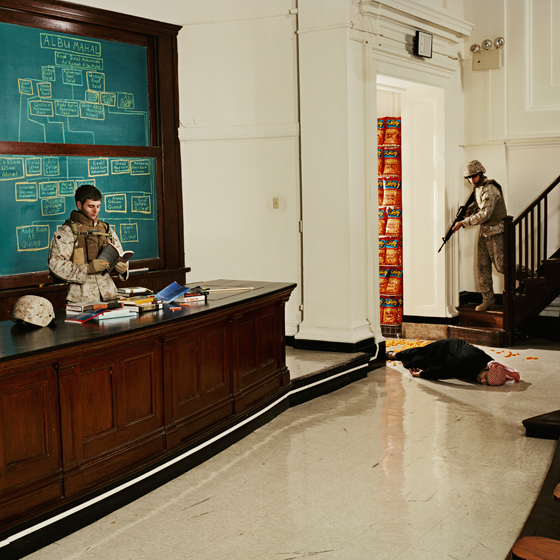|
 |
|
|||||||||
On April 17, 2004, Lima Company was in a twelve-hour firefight in Husaybah. Four marines in my platoon and our company commander were killed in the first half of the day, with more marines wounded. Shortly after the four marines in my platoon were killed, our lieutenant passed the word that the new rules of engagement [ROE] from Lieutenant Colonel Lopez were that any military-aged male wearing a black dishdashah and a red headdress, even if unarmed, was an enemy combatant and was to be shot on sight. The rationale for this was that the resistance fighters were wearing similar outfits, even though such outfits were common in Husaybah. Lima marines eagerly embraced the new ROEs and began shooting at anyone within eyesight wearing the aforementioned outfit. I remember turning a corner and witnessing the marine in front of me raise his rifle at a civilian man who stepped out of a doorway. The man was wearing a black dishdashah and a red headdress. He was unarmed and appeared to be around 50 years old, with gray hair. I cannot remember the marine actually shooting the man. I have discussed this incident with a VA psychological counselor, and she informed me that it is possible my brain blocked the memory of the shooting because it was so traumatic. The next part of that incident I remember is stepping over the dead man’s body to clear the room he came out of. The room was a small storage room full of an Arabic brand of cheesy puffs (like Cheetos). There were no weapons in the room, nor were there any weapons on or around the deceased man. After this incident, I actually extended my contract by ten months to redeploy to Ramadi for my third tour. My agreement with my commanding officer for extending was that I was going to lead this little experimental intelligence section. This assignment allowed me to read all the intelligence reports that came in every day, from everywhere. There was one report of an army unit that got in a firefight with a bunch of insurgents somewhere in the middle of town. There was this local traffic cop who, according to the report, was apparently pro-American, and he was accidentally killed in the crossfire between the insurgents and the army. His family knew that he was pro-American and they generally leaned that way too, but the day he died, his brother and two cousins joined the insurgency. Later I read about this sort of tribal culture where they’re socially obligated to get revenge. When someone is killed, that’s initiating a blood feud. You’re socially obligated to get revenge and you would be stigmatized if you didn’t. So this traffic cop was our friend, and by accidentally killing him we created three more enemies. That was the first real proof that trying to win the way we are is mathematically impossible. We’re trying to win by killing, and the simple math is that we’re multiplying our enemies every time we kill someone. That report talked about his whole family with the same last name, who was the son of whom, and who was pro-American and who was anti-American. So we made a flow chart of the whole family and we circled all their names in green, and then those three that were insurgents, we circled in orange. A couple of months later I got another report talking about the exact same family and almost every one of them was an insurgent. I just went through circling all of these names in orange. You just had this big flow chart on the wall and everything was orange. Jason Lemieux is currently studying political science at Columbia University. Descriptions of the Husaybah firefight are from Jason Lemieux’s testimony to the Congressional Progressive Caucus as part of the “Winter Soldier on the Hill” event in Washington, DC, where members of Iraq Veterans Against the War gave eyewitness accounts of their experiences in Iraq, May 15, 2008. The remainder of this text was transcribed and edited from interviews conducted by Jennifer Karady in August 2008. |
|||||||||||
© Jennifer Karady 2022, all rights reserved. |